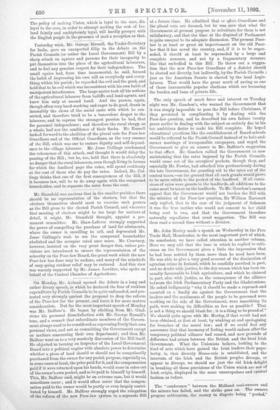Yesterday week, Mr. George Russell, the Under-Secretary for India, gave
an. unexpected fillip to the debate on the Parish Councils (or rather the Local Government) Bill by a sharp attack on squires and parsons for their incapacity to put themselves into the place of the agricultural labourers, and to feel any genuine respect for their independence. The small squire had, from time immemorial, he said, formed the habit of impressing his own will on everybody and every- thing within his parish; he regarded the evil and the good, and held that to be evil which was inconsistent with his own habit of omnipotent interference. The large squire took all his notions of the agricultural labourer from bailiffs and land-agents, and knew him only at second hand. And the parson, again, though often. very hard-working and eager to do good, drank in insensibly the views of the social caste with which he con- sorted, and therefore tried to be a benevolent despot to the labourer, and to repress the strongest passion he had, that for personal independence; and therefore the rural clergy, as a whole, had not the confidence of their flocks. Mr. Russell looked forward to the abolition of the plural vote for Poor-law Guardians and of the Official Guardians, as the very essence of the Bill, which was one to restore dignity and self-depend- ence to the village labourer. Mr. Jesse Collings condemned the vehemence of this attack, and thought it would delay the passing of the Bill ; but he, too, held that there is absolutely no danger that the rural labourers, even though living in houses for which the landlord pays the rates, will spend recklessly at the cost of those who do pay the rates. Indeed, Mr. Coi- ling thinks that one of the first consequences of the Bill, if it becomes law, will be to do away again with the compound householder, and to separate the rates from the rent.






































 Previous page
Previous page